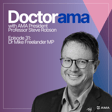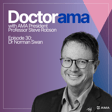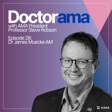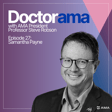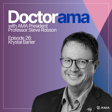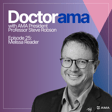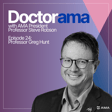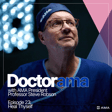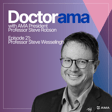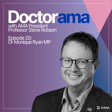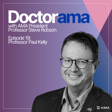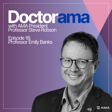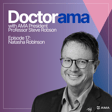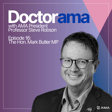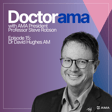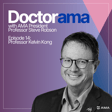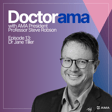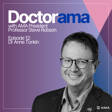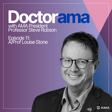Become a Creator today!Start creating today - Share your story with the world!
Start for free
00:00:00
00:00:01

Episode 21 - Dr Shaun Donovan
In episode 21 of Doctorama AMA President Professor Steve Robson chats with Dr Shaun Donovan.
Recommended
Transcript
Introduction to Pathology
00:00:00
Speaker
Well, there's one specialty that is absolutely critical to virtually every other specialty. In fact, this specialty is involved in the diagnosis of just about every disease in the country and probably around the world. We're going to find out what that is today on Dr Ram.
Meet Dr. Sean Donovan
00:00:20
Speaker
You're listening to Dr Rama with Steve Robson, bringing you the best of health, medicine and people. Well, my guest this week on Dr Rama is Dr. Sean Donovan, who is a pathologist and quite a pathologist. Welcome to Dr Rama, Sean. Thank you very much for having me, Steve. It's a real pleasure. Now, I understand you're up on the Gold Coast at the moment as we speak, but your heart is in Tasmania and you're a proud Tasmanian.
00:00:46
Speaker
Tell me all about it. I am a very proud Tasmanian,
Journey into Pathology
00:00:50
Speaker
Steve. So I was born in Hobart. And it's an interesting story is that the house I currently live in is across the road from the hospital I was born in. So I've traveled about 100 meters during my life. But in between all of that, I went to school at a Catholic boy school.
00:01:15
Speaker
in Hobart called some Virgil's College and I'm a proud old boy of that school. We're one of the sponsors of the some Virgil's old scholars football club so I still have ties with that school. I did my medical training at the University of Tasmania, an amazing
00:01:40
Speaker
course. It was six years back then when I did it and we did pathology in second and third year Steve and I always really enjoyed it. So back then pathology part of the course was actually very extensive. So the first year we sort of did basic pathological sciences and then in the second year of pathology it was the organ systems
00:02:07
Speaker
because back then it was really recognized by the medical school as the basis of medicine. You can't understand medicine without understanding pathology. Actually, one of my tutors in pathology back then was a fellow by the name of Dr. Daniel Owens, who I believe is on the Federal AMA board as the pathology representative.
00:02:32
Speaker
Yeah, absolutely. We're not going to say too much about Dr. Owen's age, so we might like that one. He was my tutor, so you have to at least assume he's older than I am. But I loved pathology, and the pathology department at the Royal Harvard Hospital, the public system, was staffed by two amazing histopathologists,
00:02:57
Speaker
John McCardle and David Chalice and they used to take us
Influential Mentors
00:03:01
Speaker
for lectures. And look, I still do lectures even now for the second and third year medical students. I lecture them on breast pathology, liver pathology, GI pathology, and male genital urinary pathology. So I appreciate what David and John did for me when I was a medical student. So I've been doing those lectures for a very, very long time. Look, I was going to say that I obviously have a similar
00:03:27
Speaker
vintage and we did a lot of pathology at my medical school in Queensland. We spent a lot of time in the pathology museum with those specimens in pots. Did your medical school have a similar setup? Yes, it certainly did. We used to spend a long time looking at those pots in their perspec glass, our floating informal. Look, I did enjoy pathology a lot. When I did my intern year,
00:03:58
Speaker
There wasn't a pathology job available in Tasmania. Back then there were only two registrar positions for the whole state and there were already two people doing pathology. And so I did a year of basic physician training and then I was about I just was in my ICU rotation.
00:04:16
Speaker
I'm about to go off to the northwest coast to Burney to be the medical registrar for the public hospital up there. Not looking forward to it at all and David Challis came to me and said
00:04:29
Speaker
I know you've always been interested in pathology, Sean. One of the registrars has dropped out for next year. Would you like the job? And I jumped at the opportunity.
Challenges in Pathology Training
00:04:38
Speaker
Look, it's really interesting the lure of pathology because I think, certainly in my era, and we were speaking earlier on and I was saying that I had
00:04:51
Speaker
interest in being a pathologist. But I think the thing that put me off at the time, and when I did a medical science degree in pathology, was doing the autopsies. And that was something that totally did my head in. And I think that was the thing that swung me around. I mean, that obviously is a part of the training of all pathologists. How do you get used to that? Look, I can tell you a story about one of our
00:05:21
Speaker
female pathologist, who is a very, very good pathologist. Luckily, once you start doing private pathology, you basically don't have to do autopsies anymore. You're doing as part of your training. She liked pathology a lot, and so she was willing to
00:05:41
Speaker
you know put up with the how uncomfortable it's my to make it feel when she was doing them as a as a registrar to the point when she's going on top she used to be gagging the whole way through the. Yeah yeah yeah so I never had that issue and look.
00:05:59
Speaker
Autopsies now are very few and far between. The number of autopsies that occur, besides obviously the forensic autopsies that forensic pathologists do, the hospital-based autopsies are fairly limited now, mainly sort of pediatric neonatal type autopsies really now. Yeah, they were a big feature and I guess maybe it's just the era of the times that you and I
00:06:24
Speaker
you and I trained in. I think people have so many options now with imaging and things like that that they maybe didn't have when we were training. So a lot of the time, the diagnosis is pretty well known at the time of death, I suppose.
Pathology Training and Specialties
00:06:40
Speaker
As I said earlier, I did a medical science degree in pathology and I don't think I was very good at it. And one of my supervisors was
00:06:49
Speaker
a gentleman called Richard Steele, and he was a pulmonary pathologist, but he said, Robson, the general principle is that a light source will project a beam up through a tissue that will go through a series of lenses to your eye that will
00:07:10
Speaker
display an image in your brain he said what happens with you robson is an image forms in your brain that is transferred down onto the slide it's the other way around. Yeah so he didn't think i was really good at reading histopathology slides and that really is an extraordinary art isn't it how long does it take you to get your eye in with this. It definitely is and you're right steve i have come across people
00:07:40
Speaker
in my time of pathology that just can't do that. Exactly as you've said, their brain just doesn't work that way where the image that comes up the microscope to their eyes, no matter how hard they work and how much they try, they just can't sort of get it. And to the other extreme where there are some pathologists that I know that basically you put the slide under the microscope for
00:08:05
Speaker
one second and they already know what the diagnosis is. The training involved to become a pathologist, it's a minimum of five years. You have to pass, you have a first-part exam that you tend to do in your third year of training.
00:08:20
Speaker
and you have a second-party exam that you do in your fifth year of training. And that's for anatomical pathology or histopathology, which is what I am. Because there are obviously many different specialties in pathology besides histopathology is probably the most common one.
00:08:37
Speaker
as probably most of the pathology fellows in Australia are histopathologists, but we also have a lot of lab-based hematologists, microbiologists, general pathologists that do a little bit of everything, chemical pathologists, immunologists, genetic pathologists, so there's a lot of different areas. Yes, I always thought the interpretation of slides was a bit like being a wine expert. People are commenting on the
00:09:02
Speaker
you know, whether it's the overtones of pepper or the neutrophil infiltrates and things. So it really takes quite a kind of experience and a special type of way of looking. I'm going to talk about a couple of things shortly that I think are really important. One is artificial intelligence and the other is genetics and
Patient Interaction in Pathology
00:09:24
Speaker
genomics. And you just brought that up before.
00:09:28
Speaker
But I guess I'm going to ask the obvious thing before we move too far forward, and that is, do you miss direct patient contact? Because it is one of those areas where you have minimal direct hands-on patient, or if you do, they're dead. Do you ever miss that? Do you regret it, or are you just so immersed that it's totally satisfying?
00:09:56
Speaker
I must admit, I have to say I have not missed it. I mean, I do have a little bit of patient contact, so I will occasionally do fine needle aspirates on patients. They'll be sent in with a lump on their neck or something like that. Most fine needle aspirates these days are obviously radiologically guided, but occasionally we do get some sent in to us to do freehand fine needle aspirates. So I do occasionally get to talk to patients
00:10:25
Speaker
But that's pretty much it. Most of the times I'm either in theater doing a frozen and they're anesthetized, so they're asleep. Or sometimes I will do FNA's under bronchial ultrasound and the patients obviously are still asleep then. So yeah, I get to talk to the nursing staff and the other specialists, but I very rarely get to talk to the patients.
AI in Pathology
00:10:57
Speaker
Look, I'm going to ask you a little bit about artificial intelligence, because we were talking just before about how some people are very good at the pattern recognition that you require to be a good histopathologist. But AI, clearly something that's also good at pattern recognition. What are your feelings about
00:11:19
Speaker
the role of artificial intelligence technologies, particularly in the specialty of histopathology? Absolutely, Steve. I think you'd be putting your head in the sand if you didn't think that there would be a role in histopathology in the future with AI. Just like radiology, if you're looking at something that's a two-dimensional image that's on a computer screen,
00:11:45
Speaker
Absolutely artificial intelligence programs can certainly. Can do certainly do that pattern recognition and and diagnose things. Where it sort of look I can I talk about my experience with the company that I work for. So the health care.
00:12:04
Speaker
It's being viewed as being a quality use rather than replacing pathologists, so it takes a lot of work to
00:12:19
Speaker
to say get an product up for an individual organ system because what you need to do is basically you know get five you know maybe half a million cases of a particular organ system.
00:12:35
Speaker
Did you scan pathologist that have to map it out and say well this part's been on this party is. A lignite this part means this this part means that obviously you need to have consensus amongst a lot of pathologist that takes a lot of time and then you can then let the AI program work and what i think it will what.
00:12:55
Speaker
sonic at least are looking at using it for. Is so that it will save you time where you have to you know make accurate measurements on how much percentage of a core is involved by cancer or what the nuclear proliferation right on on the immunohistochemistry is. And so what we'll do is I think.
00:13:16
Speaker
pathologists will still report and look at the slides, but the program will be looking in the background and saying, well, that's right. What you've said is right. Did you consider this little tiny little focus over here? Did you consider that that might be a tiny little additional focus of cancer? So I think it will be a really, a really good quality control. It will reduce errors. But you're not worried about your job. I'm not.
00:13:45
Speaker
Absolutely, Steve, I can't predict what's going to happen in 20 or 30 years time, but I'm certainly not worried about my job at the moment. No. Look, just talking about jobs and correct me if I'm wrong, but for a while it was difficult recruiting newly graduated doctors to pathology training.
Pathologist Shortage Concerns
00:14:07
Speaker
Is that still a thing? Yes, it is. Actually, it's interesting that you mentioned that I had
00:14:12
Speaker
I had a meeting today with quite a few people from the College of Pathologists and we're actually looking at the workforce situation for the next 15 years or so and there's going to be a significant shortage of pathologists in all areas of pathology in the next 15 years. Really the only sub-specialty of pathology where there's not going to be a shortage of hematology
00:14:41
Speaker
all the other areas of pathology. They're looking at ranging from having half the number that will be required in 15 years time to sort of you being 10% down or 40% down and what the actual number should be. So it's a big issue. It is a very big issue still.
00:15:02
Speaker
What do you think? I mean, if you were giving advice to a recently graduated doctor who was weighing it up and they said, oh, look, I'm not really sure about a career in pathology, how would you respond to that?
00:15:15
Speaker
If I was talking to someone who was a recent graduate who wasn't sure what specialty, whether they wanted to be a GP specialist or a non-GP specialist, I would recommend pathology in that it's a very mentally stimulating specialty.
00:15:36
Speaker
Of course, as with all specialties, you're going to see your bread and butter things every day. But in pathology in particular, you will at least once or twice a day get a case and you just go, wow, what is going on here? And you have to really think about it. And in pathology, you have time to think about it. You can
00:15:58
Speaker
You know you have a patient sitting there in front of you you got slide sitting there you can you can talk to your colleagues you can go to the textbooks you can order special stains and actually coming up with a diagnosis in these difficult cases is really really rewarding. Another really attractive thing about pathology is look.
00:16:18
Speaker
In most situations it really is a Monday to Friday job. It doesn't involve a lot of weekend work or after-hours work. And for that you're quite well remunerated. You're not going to be remunerated up to the level of some of the specialties, but for the lifestyle benefits and the mental stimulation you get, that's probably the tact I would take.
00:16:45
Speaker
So I'm going to ask you something else now, Sean. And this admittedly was years ago when I was doing my Pathology Medical Science degree.
00:16:56
Speaker
The neuropathologist said his area was the most difficult. The dermatopathologist said his area was the most difficult. The pulmonary pathologist said, you know, my area is the most difficult. That hasn't changed, Steve. Sure it hasn't. What do you find difficult? What do you look at and say, oh, God, you know, I really can't. Is there any particular organ or area that you're just not so enthusiastic about? Look, when I worked in public,
00:17:28
Speaker
at the Royal Harbour Hospital as a consultant. That is the state-wide referral area for renal biopsies. I really enjoyed renal biopsies, but they are very, very challenging. And they were the sort of things that could be something that you've called in on a Sunday afternoon because someone's in acute renal failure. So the renal biopsies were challenging. So that's an area that I found
00:17:57
Speaker
Difficult but i you know as with anything in medicine or in life state the more you do things the better you get at them yeah i also do neuro neuro uh neurosurgical frozen section so i go out to one of the private hospitals in
00:18:13
Speaker
Actually, the hospital that's across the road from my house, and so I do neurophrases and sections there, and sometimes they can be quite tricky. Obviously, the neurosurgeon would like to know whether they have given you lesional tissue rather than someone's normal brain, because it's not something that they want to have to repeat. So, things like that can be a little bit stressful at times, where you've got to make a rapid decision.
00:18:38
Speaker
I think it's a bit that would be probably there's every area of pathology whether it be pulmonary or urology or there's always difficult cases.
00:18:53
Speaker
And there are always people climbing their areas the most difficult. Yeah, and look, to be fair, I mean, in skin, melanocytic lesions are the ones that cause us probably the most consternation. They're difficult clinically for the dermatologists and plastic surgeons and GP specialists that deal with them. Yes. And that can be very difficult histologically as well.
Genomics Transforming Pathology
00:19:15
Speaker
Yeah. Now, look, I'm going to quickly ask you about advances in genetics and genomics, and you were saying that
00:19:23
Speaker
before, how have they, I guess, what impact have they had on pathology as a discipline, and I guess your ability to diagnose and help patients? It's had a massive impact, Steve. Look, all I can sort of
00:19:41
Speaker
do is give you an example when I started, I might be showing my age a bit here, but when I started, I'd say someone sent in a breast specimen for me to report. It would probably, you know, the only thing we really looked at was the estrogen and progesterone receptors on the tumor because really Tomoxifen was really the only
00:20:04
Speaker
additional treatment. They got, you know, if they had metastatic disease they had quite toxic chemotherapy that in most situations really didn't help much if you know what I mean. I mean that situation has changed not only in breast cancer but in so many other cancers. I mean now we're not, so a breast cancer report 25 years ago when I started would have probably been, you know, lucky to be a page in length and maybe took, take me, you know, maybe
00:20:33
Speaker
20, 15, 20 minutes. Now a breast cancer report is probably four or five pages in length and probably takes me about two or three hours to report. So you're looking at things like, you know, HER2 status. So are they able to have a septum? You're looking at things like the K67, the nuclear proliferation rate, because then that may decide whether they need chemotherapy or not suitable for chemotherapy. And even now we're doing PDL1
00:21:01
Speaker
triple negative breast cancer to see whether the patient is appropriate for immunotherapy and we all know about immunotherapy in melanin metastatic melanoma but that's moving into so many other solid organ tumors. And look it's it's the same with all of them then the amount of immunohistochemistry and the molecular panels that we do on these tumors. Has exploded but it's a really important for the patient still because
00:21:28
Speaker
It means that their treatment can be personalized. Back when I started, it was basically just throw chemo or throw radiotherapy at them. Now, they are getting their treatment tailored to them, so there's much less toxicity, and the prognosis is so much better. Yeah, it's absolutely transformed the management.
00:21:49
Speaker
It has, absolutely. So it has transformed pathology too. We obviously are right at the forefront of this sort of genetic revolution. Now it brings me to a very important question and we've just heard about the extraordinary advances, the capacity of pathology to add richness to a diagnosis and to guide and inform management and we're seeing these incredible advances.
Pathology Rebates Issues
00:22:15
Speaker
The rebates for pathology have really been stuck in the sand for decades. This must drive pathologists and pathology firms totally around the twist. Dealing with this, what's your take on the way the rebates have just been stuck like that?
00:22:38
Speaker
Yeah, look, I suppose that last example I used, you know, where, you know, I said, you know, it took me 15, 20 minutes to do a breast cancer report 25 years ago, and it would be one page in length. Now it takes me two or three hours and it's five or six pages in length. The Medicare rebate that I receive for that
00:23:01
Speaker
very complicated, personalised breast cancer report is exactly the same as the one I received 24 years ago when I started. So in fact, it's less really in real terms, isn't it? Yeah, absolutely. You're getting less now for that than you did. So CPI in the time that our Medicare rebates have been freezed, CPI over that 24 year period has gone up 97%.
00:23:26
Speaker
Yeah, it's absolutely extraordinary. Look, I think Steve, yeah, I think Steve, and look, the logic that the various governments and the Federal Department of Health have used, they've always been under the impression that
00:23:47
Speaker
Pathology is automated, so a sample comes into the lab, it's put into an analyzer, and then a result is spat out. So I think that's the impression that they've always had. I mean, that is actually very incorrect. We've taken politicians around our labs to show what actually happened. So our labs are run by university graduate medical scientists. They're highly trained. And our pathologists, as
00:24:16
Speaker
your listeners all know we're all specialist doctors so every result that comes from these analyzers has oversight from these highly trained experts to ensure the accuracy of the result which our medical colleagues then base treatment decisions on so absolutely there are areas of pathology and and the reason the how we have managed to cope with it the rebate freeze for so long is because we have automated but we're at the point now
00:24:45
Speaker
where there's no more... We've automated everything that we can automate, basically. So unless there's some investment in pathology, there is a possibility, and it will be a decision for individual companies and pathologists to make, but there is a possibility that the 99%, over 99% bulk billing rate for GP pathology episodes, that may start to come down. The other thing about pathology is that
00:25:15
Speaker
know we have six thousand collection centers across the country so they're and they're in room and- one in three of them are in regional areas. You know those are the sort of things that will would you know you'd have to look at if you're all running a business- if you're not getting. Any additional Medicare funding and you haven't had any for twenty four years despite all your other costs going up. Then that's when you start to look at your bulk billing rates and- as as with others. With G. P. specialists and and and- non G. P. specialists.
00:25:45
Speaker
And you have to look at your less profitable, non-viable collection centers. And to be fair, unfortunately, most of those will be in rural and regional areas. But as I said, that's not something that any of us want to do. All we want is a modest investment by the government. We're just asking to be treated like the rest of the medical profession. So we're just asking for
00:26:16
Speaker
an increase over the next four years, which would be half of the forecast CPI. So it comes out to be at most around about 1.5% indexation per year for about four years. Some years it's even lower than that. And we are only 1.5% of the annual health budget, Steve.
00:26:40
Speaker
Five hundred million pathology tests are done every year and so we do provide very good value. We are a small component of the health budget. So the money we're looking for is
00:26:52
Speaker
630 million over that four year period. And we just want indexation just like, you know, general practice has got, just like radiology has got. We just want to be treated like everyone else. Yeah, look, absolutely, Sean. The contribution that pathology makes to health care in Australia is absolutely incredible. And I think every single Australian who's ever had a test, and that's most Australians, will be really in behind you on this.
00:27:22
Speaker
Sean, it's always fantastic to catch up and talk, and I know that you're travelling at the moment, so I'm really grateful you've made time in your busy schedule to speak to me this evening. When do you actually get back to Tassie?
00:27:34
Speaker
I get back on Sunday night. Look, don't spend all your money at the casino on the Gold Coast. I'll try not to, Steve. Thank you very much for taking the time to have a chat. Us pathologists tend to be sort of hidden away and a lot of people don't know exactly what we do. So it's always a really great benefit to us to be able to use these sort of forums to get our message out of how important pathology is.
00:28:01
Speaker
to medicine and the management of patients and their illnesses absolutely look you may be hidden but you're hidden treasure thank you so much that's very nice and thanks everybody for listening to dr
00:28:25
Speaker
You've been listening to Dr Rama, a podcast produced on Ngunnawal country by the Australian Medical Association. All rights reserved.
